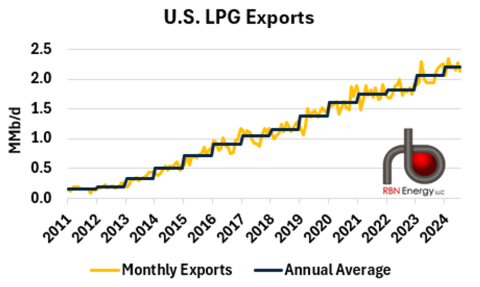A slew of LPG, ethane and ethylene export projects are underway along the Gulf Coast, a direct result of rising U.S. NGL production and generally flat domestic demand. Three of the projects will provide “flex” capacity of some sort — that is, the facilities will be able to shift between LPG and ethane exports or, in some cases, between ethane and ethylene. In today’s RBN blog, we review the history of U.S. LPG and ethane exports, why midstreamers have been struggling to keep up with export capacity, and how the ongoing addition of flex capacity is likely to play out.
Before the Shale Era, the U.S. was a net importer of LPG (propane and butane); however, the U.S. began exporting LPG in earnest in the late 2000s as domestic production soared without a corresponding increase in domestic demand. The increasing exports quickly led to bottlenecks and very soon export terminal capacity was maxed out. What followed was a massive buildout in terminal capacity. Figure 1 below shows the evolution of LPG export levels — the stair-stepping black line shows annual average exports and the orange line shows monthly exports.
Figure 1. U.S. LPG Exports. Source: EIA
As propane and butane production increased, so too did ethane output. The initial increases in ethane production were met with a wave of new Gulf Coast steam crackers (plus one in western Pennsylvania) specifically designed to use ethane as the feedstock for making ethylene (along with other petrochemical byproducts), which then gets transformed into polyethylene and other plastics. The first of these exports occurred out of Energy Transfer’s Marcus Hook terminal near Philadelphia. In its first full year of operation (March 2016 to March 2017), Marcus Hook, with export capacity of 70 Mb/d, exported 30 Mb/d of ethane to Europe. Enterprise Product Partners’ Morgan’s Point terminal near Houston was the next to start up in September 2016 with a capacity of 240 Mb/d.
Join Backstage Pass to Read Full Article









